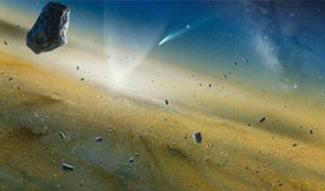RATIONALE
Understanding the formation of stars and the formation of planets,are both cornerstone challenges in modern astronomy. These highly multi-physics and multi-scale problems are tightly linked through the formation and evolution of proto-planetary discs. As such, they should ideally be apprehended simultaneously. In practice however, due to the great variety of instruments and techniques that must be used as well as the profusion and complexity of physical processes, the field is traditionally subdivided in three communities addressing specific questions all relevant to reach a global understanding, including:
-the formation, collapse and fragmentation of dense cores which also addresses the issue of centrifugally supported discs formation and early evolution around the youngest protostars (i.e. younger than typically 1 Myr)
-the evolution of protoplanetary discs whose main objectives are the origin of the angular momentum transportation, the dynamics of gas and dust as well as the growth from grains to planetesimals
-the study of solar nebulae constituents such as gas, grains and pebbles from a dynamical and chemical perspectives
Recent facilities such as the space observatory Herschel, and ground based observatories like ALMA and the VLT/VLTI have already started to revolutionise the field of star and planet formation. The forthcoming James WebbSpace Telescope (JWST), and potentially in the more distant future ELT, ARIEL and SPICA, are expected to provide the observational tools to bring our understanding of planetary origins and diversity to a new level. These new observational tools, as well as the development of comprehensive models, numerical simulations including more and more physical ingredients as well as laboratory measurements, finally open the door to meaningful combination of tools and results from the different communities.
The opening of these new facilities, telescopes, super computers and laboratory experiments, as well as the significant progresses made on the theory side, make the organisation of collaborative workshop particularly timely. Not only to bring together the three communities but also the observers,the theorists and the instrumentalist who are solely altogether present.
For more information please click here

